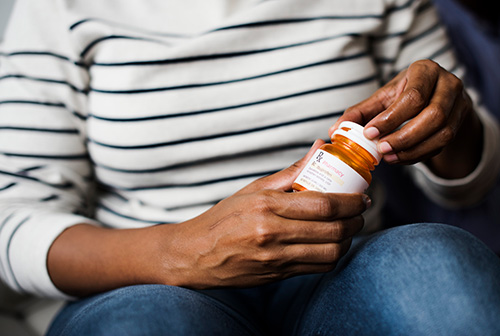Authored by Dr. Sharon Stills, NMD
There has been nearly non-stop controversy surrounding the health risks of hormone replacement therapy (“HRT”) in the decade following the Women’s Health Initiative (WHI) study. Back then, women by the millions stopped their HRT suddenly — often to find that their symptoms reappeared right away. Many of the big pharmaceutical companies pushed back, criticizing the WHI study and making new claims about the efficacy of HRT.

Understandably, many women feel confused about whether to get off HRT or avoid starting it. But new studies continue to support the unsettling conclusion: synthetic HRT really is risky when compared to the benefits it provides.
If you want to quit HRT, but aren’t sure how, you’ve come to the right place. There are great ways to get off HRT without symptoms or side effects. We’ve helped hundreds of women safely wean off HRT, and we can help you too.
HRT withdrawal — don’t quit “cold turkey.”
Many women are so motivated to stop HRT that they quit overnight, which is very stressful for the body. That’s because it has grown dependent on this external supply of synthetic hormones. Your body had the ability to make its own hormones — right through perimenopause and menopause — but when you began HRT it cut back its production. But here’s a little-known detail about your sex hormones: your body can naturally resume its production of estrogen, testosterone and progesterone, even developing secondary hormone production sites to compensate for the decline in hormones from your ovaries. It’s just that your body needs time and support to develop those sites.
In addition, we believe the stronger estrogen replacement therapy drugs, such as Premarin and Prempro, actually alter the estrogen receptors in your cells so they only recognize the synthetic hormone forms. It takes time for those receptors to resume their original form and accept natural hormones, whether it’s your body’s own hormones, bioidentical HRT supplements, or plant-based hormonal support in the form of phytotherapy.
Keep this rule in mind: the more severe your original symptoms, the stronger your HRT prescription, and the longer you used that therapy, the more likely it is that you will have symptoms of HRT withdrawal when you quit.
Support yourself naturally when getting off HRT
Your body has the power to make and balance its hormones at every stage of your life, but it needs adequate support. That means rich nutrition, a well-functioning digestive system that can really absorb nutrients, a strong metabolism, and a steady routine of exercise and stress reduction. If your symptoms are moderate to severe, you can add phytotherapy, nutrients, and make dietary and lifestyle changes to normalize your hormone levels naturally and more quickly. The more severe your hormonal imbalance, the more support you’ll need. After you’ve weaned off HRT completely, your body will require less support.
Ideally, you will have the opportunity to put this protocol of support in place before you begin to wean off HRT. We advise everyone to allow 2–4 months for the weaning process overall, if possible (some require a little less, some more). If you do it with care, you can feel better than you ever have in your life.
How to deal with stubborn “rebound” symptoms
After making exciting progress in the first few weeks of weaning off HRT, women may “plateau” and find themselves with stubborn symptoms that won’t go away. They may jump to the conclusion that the lack of hormones and estrogen replacement is to blame and say, “This isn’t working.” But in fact, the natural alternative to HRT is working — it’s gradually healing the issues that created the conditions in the first place. And if you can find relief from common rebound symptoms, you’ll be able to complete the process of tapering down with targeted support.
Natural remedies for the top four HRT rebound symptoms
1. Hot flashes. In addition to herbs like black cohosh, red clover and kudzu, we recommend avoiding caffeine, sugar, and alcohol for two weeks to see if your symptoms subside.
2. Weight gain. Carbohydrate consumption is a key factor with weight gain in menopause. Keep the carb content of each meal to 16 grams or less and snacks to 7.
3. Insomnia. We offer a unique sleep and relaxation product to help reset your circadian rhythm, but you might also try setting a regular bedtime and scheduling at least an hour of downtime (electronics-free) before bed.
4. Anxiety. Deep breathing, yoga, and being outside in nature are all helpful ways to calm your body and mind.
Don’t be surprised if you need help, especially in the beginning
While many women know there are natural alternatives to HRT, lots of them spend months randomly self-prescribing soy, dong quai, black cohosh, and so on without knowing how much to take or what forms work best. Each of these natural therapies can have positive effects, but we recommend a multi-herb formula like our Herbal Equilibrium for best results.
Our Getting off HRT Protocol takes the guesswork out of natural menopause relief. Our weaning schedule includes directions on how to taper off HRT and identifies the herbs and supplements to take in place of it. We include Herbal Equilibrium (to balance estrogen, testosterone, and progesterone), Serinisol (to regulate sleep patterns), a doctor-formulated multivitamin, Omega 3s, and a diet and lifestyle eGuide. Plus we include personalized phone support from our experienced Nurse–Educators at no extra charge. We’ve helped so many women get off HRT, and we can make it happen for you too.
To get started, take our Menopause & Perimenopause Quiz. If you have questions about whether the Health Protocol will work for you, call us toll-free at 1-800-448-4919.









